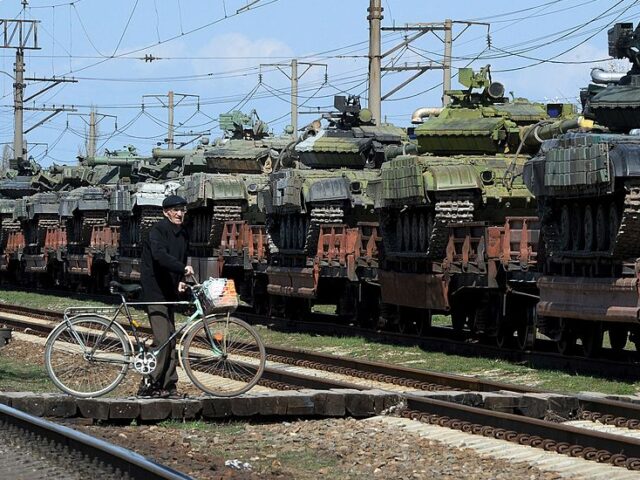Russia has experienced a recent “uptick in rail accidents” near the Ukraine border and the country will struggle to protect its internal railway system it relies on to move military supplies, a British intelligence report says.
Russia’s internal security services “will highly likely remain unable to fully protect Russia’s vast and vulnerable rail networks from attack”, the British government has said, in remarks that come just days after a major rail crash near the Ukrainian border which saw track blasted with explosives, causing the derailment and burning of an oil tanker train.
A second blast and derailment for another Russian freight train came the following day.
Russia has recently experienced a surge in ‘accidents’ of this kind, which seem to focus strongly on strategic infrastructure like oil bunkers and refineries, as well as railways. While Russia has been circumspect in attributing causes to these events — and has even censored references to them in the newspaper, leading to the development of jokes and memes in Ukraine over the new, politically correct language in Russia, others have pointed out it is likely saboteurs are at work.
As the UK Ministry of Defence puts it: “A recent uptick in Russian rail accidents in areas bordering Ukraine, attributed to sabotage committed by unknown actors, has almost certainly caused short-term localised disruption to Russian military rail movements.”
Where Russia does apportion blame for explosions, it points the finger at Ukraine. More often than not, Ukraine denies responsibility and — as in the case of a blast at the Kremlin itself this week — suggests a local Russian resistance may be working to take down the government.
While incidents like this week’s rail explosion and crash are extremely dramatic, the Ministry of Defence points out the Russians do have the expertise and resources to fix blown-up railways quickly. Russia is uniquely reliant on its railway network to wage war: the sheer size of the Russian Federation and how sparsely populated most of it is means the Russian government was an early and enthusiastic adopter of railways in the early 19th century days of the technology.
Indeed, as a fellow of London military think-tank RUSI notes in a 2022 review of Russia’s rail-based military logistics chain, the country is the only one in the world to have a full-time corps of military railway engineers — Railway Troop Brigades — who are experts in keeping battle-damaged lines open and locomotives running. Some other nations used to have railway corps in the past but disbanded them, or today keep a kernel of that institutional knowledge within the military through reserves. Most have no such force at all.
While Russia’s “over-reliance” on railways for army logistics was cited as a weakness last year, a more recent assessment of Russia’s military progress in the war by the U.S. supreme commander of European forces found their use of railways was highly effective, and it was actually the “final mile” from the end of the railway to the front line the Russians were struggling with.
General Christopher Cavoli said: “…the Russians have proven extremely adept at operational-level logistics. They can move large amounts of stuff long distances. But once it gets off the train, that last mile, as it were, that’s part of the system too and they were not ready for that.”
While Russia’s Railway Troop Brigades may be able to repair regular rail quickly after an attack, some infrastructure is more critical than others. Ukrainian saboteurs hit global headlines in October 2022 then they blew up the strategic Kerch to Crimea, and important symbol and logistical link for Russia. According to the Russian government, the rail bridge destroyed in that attack has only reopened to traffic today, seven months later.
The work was rushed by two shifts of engineers working around the clock, said the Russian government, who said it took over 500 tons of steel to repair.

COMMENTS
Please let us know if you're having issues with commenting.